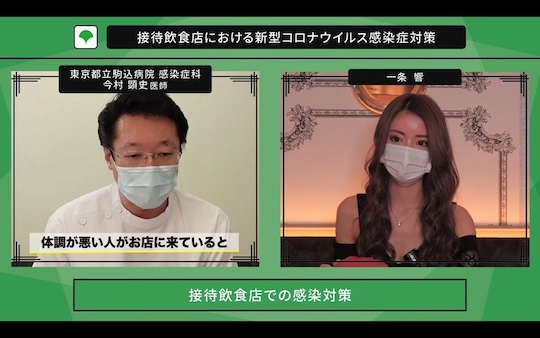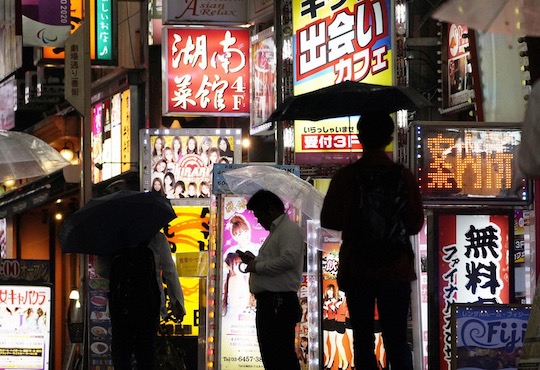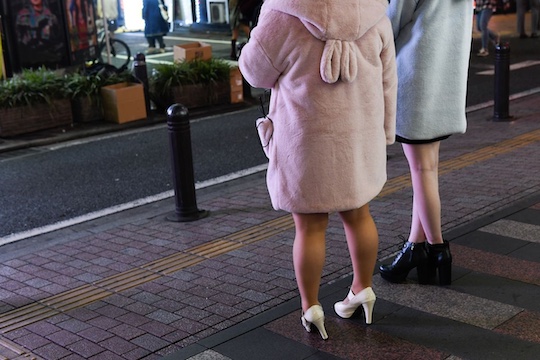Hosts and hostess team up with Tokyo Metropolitan Government for coronavirus Q&A videos with doctor
July 17, 2020
/ Tadashi Anahori
In a further sign that hosts and hostesses are skillfully trying to reframe the media narrative that has demonized their trade as hotspots for spreading coronavirus infections in Tokyo, the city's metropolitan government has released educational videos on COVID-19 that see two hosts and a hostess ask doctors questions.
After host clubs began cooperating with the Shinjuku government to initiate testing for employees and stem the spread in Kabukicho (and the demonization in the media), and the government started handing out cash payments to clubs that agree to close and to individual hosts and ...
Tokyo government pays host and hostess clubs to close during coronavirus second wave
July 13, 2020
/ Tadashi Anahori
Tokyo is experiencing a second wave of coronavirus infections, with upwards of 200+ infections announced per day. Almost all of these, so far, are younger people able to cope with symptoms and the pressure of the city's health facilities is currently minimal. Let's hope that this situation does not worsen.
As we have continued to write on these pages, much of the blame for clusters has focused -- we think, overly and unfairly so -- on the mizu shobai "water trade" world of nighttime entertainment, particularly host and hostess clubs, which have been almost demonized by the mainstream media ...
Hostess clubs are really suffering in the new normal that is living with the coronavirus.
People are understandably wary of spending prolonged periods inside small bars and clubs running up a hefty drinks tab -- even when the company of beautiful women is included. Given the proximity required for the experience, face masks -- even ones specifically designed for hostesses -- are not likely to reassure moneyed clients.
Host clubs have particularly faced media scrutiny as the cause of several coronavirus infection clusters, though are now working with the Shinjuku government to increase ...
Host clubs in Kabukicho partner with Shinjuku government to combat COVID-19 infections
July 3, 2020
/ Tadashi Anahori
Infections continue to rise in Tokyo as we enter the second wave of the coronavirus in Japan, though numbers remain very modest compared to other countries.
Much of the blame and media attention has focused on hostess and host clubs. We have followed this as part of our monitoring of how the COVID-19 is affecting the adult industry in Japan, where sex workers, gravure idols, strippers, and hostesses are facing a sudden and serious decline in income.
There has also been some name-calling between Ginza and Kabukicho, as the hostess clubs in each district try to claim that they are not the ...
Face veil masks released to rescue the Japanese hostess club industry during the coronavirus era
June 26, 2020
/ Tadashi Anahori
As previously discussed on this blog before, hostesses and hosts have received much of the blame for the spread of the coronavirus in Japan, especially in Tokyo.
The nightlife scene, particularly the seedier side in areas like Kabukicho, has found itself demonized by the authorities and media as the most obvious source of infection clusters.
While we don't doubt that intimate encounters with prostitutes or long sessions in small hostess club booths does increase the risk of infection, we are very suspicious of the narrative that the media is pushing.
Indeed, this week Tokyo announced 55 ...
Kabukicho hostess clubs blamed for second wave of coronavirus cases in Tokyo
June 3, 2020
/ Tadashi Anahori
After they were blamed for helping to spread the coronavirus in Japan, hostess clubs are once again in the media limelight for causing a second wave of COVID-19 cases in Tokyo.
Nightlife spots are resulting in fresh clusters of cases following the lifting of the state of emergency in Tokyo.
Hostess clubs closed during the state of emergency, leading to economic uncertainty for many women and the emergence of "remote hostessing" services. Now that businesses in the city like restaurants are trying to return to some semblance of normality in the second phase of the post-lockdown reopening, ...
Japanese hostesses face uncertain future as clubs close during coronavirus pandemic
April 21, 2020
/ Tadashi Anahori
Bloomberg has published an interesting in-depth article on hostess clubs in Japan during the coronavirus pandemic.
"Champagne, chandeliers and glitzy cocktail frocks are all part of the fantasy world conjured up by Japan's hostess clubs. The coronavirus has delivered an unwelcome dose of reality."
Since the outbreak, much of the media reporting and imagery promoted by politicians has unfairly blamed nightlife for spreading the virus, rather than the various other factors (also) responsible such as crowded commuter trains, offices, and regular izakaya and restaurants.
It is true, however, ...
Remote hostess club service SmaCaba keeps customers and hostesses connected during coronavirus crisis in Japan
April 15, 2020
/ Tadashi Anahori
These news stories are coming thick and fast.
Just Monday we reported on the emergence of a service using Zoom to offer a virtual hostess club experience.
Now there is SmaCaba, another remote hostess club service.
With a typically Japanese mashup of "smartphone" and "kyabakura" (cabaret club, a euphemism for hostess club) for its name, SmaCaba links hostesses and customers through their handheld devices. The session that a customer enjoys with an available hostess is conducted via LINE, Zoom, or Skype. Sessions are available from 7pm every day except Sundays.
The customer/user pays with ...
Virtual kyabakura on the rise as Japanese hostesses use Zoom to keep working during coronavirus pandemic
April 13, 2020
/ Tadashi Anahori
We recently wrote about the various ways that the coronavirus pandemic is affecting the adult industry in Japan.
While certain prostitution services are attempting to exploit the crisis for its marketing potential, the plight of hostesses is gaining attention. Kabukicho, where many hostess clubs are located, has been identified as one of the probable causes of the spread of the virus in Tokyo due to the closely confined nature of the clubs. One-fourth of people in Shinjuku infected in March were working in role connected to nightlife services.
With nightlife in the capital essentially dead ...
How has the coronavirus affected the adult industry in Japan?
April 8, 2020
/ Tadashi Anahori
With the coronavirus pandemic still raging all over the world, many people are stuck at home. If they are stuck there with a partner, the chances are they are passing the time by getting intimate together. There's nothing quite like sex to take one's mind off a crisis. Failing that, there's always masturbation, so we are sure that traffic for porn sites is going through the roof right now.
Things in Japan just got more serious, with the declaration last night of a state of emergency, although the current number of infections are still much lower than other major industrialized nations.
How ...



















